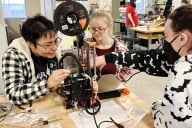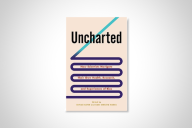You have /5 articles left.
Sign up for a free account or log in.
It had been a challenging first semester at Iowa State University for Brittni Wendling. Wendling has Larsen syndrome, a condition that means most of her joints are dislocated; she describes it as like "not having knees.” Along with the typical adjustments one makes when starting college, the freshman said she spent her first few months learning how to navigate the university’s large campus without being able to bend her legs.
She began using a three-wheeled scooter called a Triad to get around, and as the new term began in January, Wendling said she “felt like things were starting to fall into place.” Then, near the end of the month, a video of her riding her Triad was posted publicly to the photo-sharing app Snapchat.
The video contained little commentary, but its mocking tone was clear.
“The moment I saw this video, my heart dropped, and I felt absolutely horrible,” Wendling wrote in an open letter posted to Facebook this month. “Embarrassment, shame and utter sadness swept through me, and I watched the video over and over, constantly worrying how many thousands of people saw it. I just couldn't understand why someone would take the time to make me feel bad about a machine that I need to help me get around instead of even asking me about the situation if they were curious.”
Students with disabilities face a number of challenges when going to college, including accessibility and transportation issues. But even when a college offers accommodations and lessens the impact of any physical hurdles on campus, emotional and social obstacles can remain. Sometimes, the accommodations themselves become the focus of ridicule from other students.
Amanda Kraus, deputy director of disability resources at the University of Arizona and an expert on disability issues, said this kind of behavior doesn’t often manifest as “active or direct bullying,” but it is still damaging.
“I wouldn’t say that it is typical for disabled students to be blatantly bullied on college campuses, but it certainly happens,” Kraus said. “I think so often folks feel pity for disabled people, so they do not approach them with anger or criticism, but I would also say that disabled people are often doubted, misunderstood and considered to be liars who take advantage of accommodations. Think about exam accommodations and parking spots. Rather than seeing these as options that create access, they are often perceived as extra or unnecessary.”
Wendling said she tried to put the video out of her mind, though she now felt embarrassed riding her Triad to class. She kept her head down, she said, hoping to avoid seeing any stares. Days later, her Triad again drew undeserved ire from students.
As Wendling recalled, two students confronted her as they passed on the sidewalk. They told her she shouldn’t “have that thing on the sidewalk,” and accused her of riding the Triad just to “stand out.”
“With tears forming in my eyes, I just kept scooting across campus to get back to my dorm,” she wrote in her open letter. “I've definitely never been in such a cruel situation like that before, and that comment combined with being on the ISU Snap story truly broke me and majorly affected the way I felt about being at the school. Sadly, being physically handicapped and riding a machine that is not well-known isn't exactly a great way to make friends easily, but these two situations made me feel even more isolated and different.”
For the next few days, she said, she wasn’t sure she wanted to stay in college. But earlier this month, she decided she couldn’t “wallow in self-pity,” and she posted her lengthy open letter. The letter has since been shared more than 700 times on Facebook. The company that manufactures her scooter responded to the note, calling her “a brave and beautiful soul.”
Campus police saw the post, as well, and forwarded it to the university’s Dean of Students Office.
“It’s unfortunate that a small group of people would make critical comments and assumptions about Brittni,” John McCarroll, Iowa State’s executive director of university relations, said. “That’s not representative of our welcoming environment at Iowa State. It’s important to note that Iowa State’s Student Disability Resources office, and faculty and staff across campus, do everything possible to support and accommodate persons with disabilities. We want to ensure every student has access to educational resources and the ability to succeed.”
Wendling said she hopes the popularity of her letter can help other students in similar situations, as well as help educate those who might otherwise make ignorant comments about people with disabilities.
“The moral of the story is: please, please, please just be nice to people,” she wrote. “I am taking this experience and turning it into an opportunity to increase awareness for everyone at Iowa State, colleges everywhere, and just to people from around the world.”








